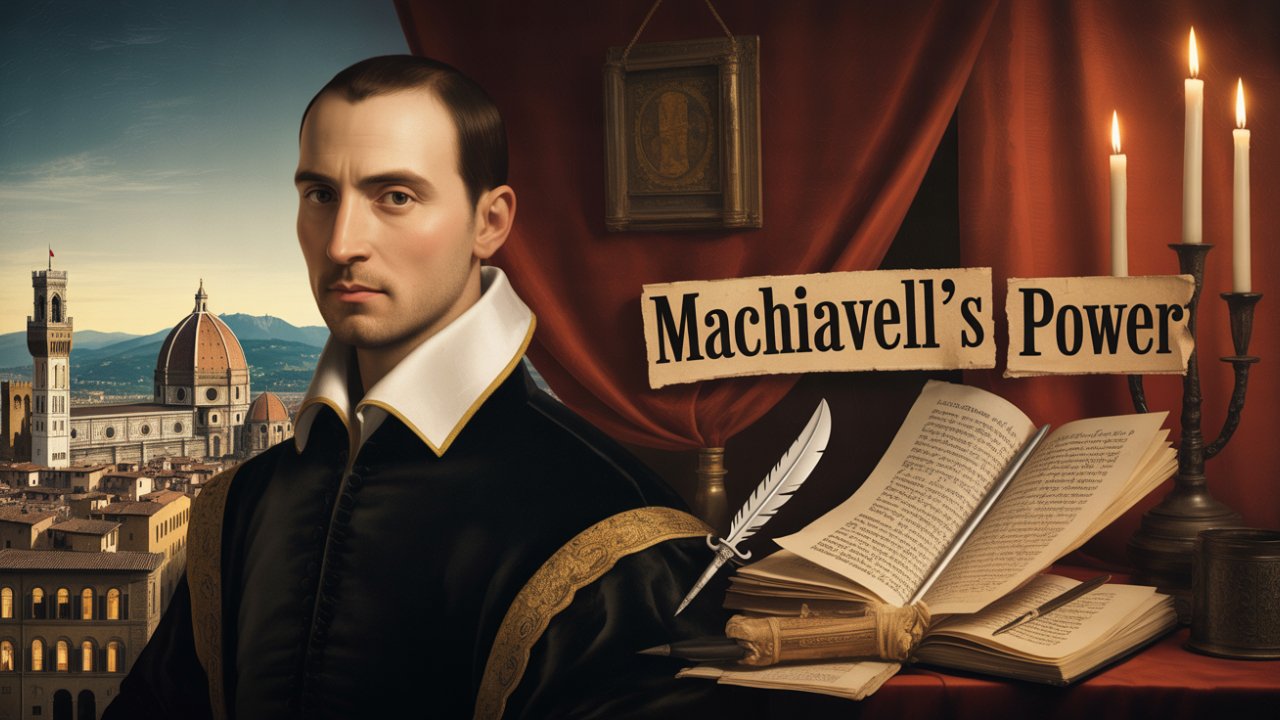The word ‘Machiavellian’ brings a lot to mind, doesn’t it? It’s a synonym for cunning, cruelty, and just plain ruthless ambition. We slap that label on politicians we don’t trust, leaders who seem to put power way ahead of morality, and strategies that are just… cold. We picture this shadowy figure, whispering poison into a prince’s ear, a master puppeteer pulling the strings of government. But was the man who wrote the infamous book, The Prince, really the monster his reputation makes him out to be?
The real story of Niccolò Machiavelli is way more complicated, more tragic, and in the end, a lot more human. To get the man, you have to get the world that made him: the brilliant, violent, and chaotic world of Renaissance Florence. This isn’t just a story about a political philosopher; it’s about a patriot, a diplomat, a victim of torture, and a writer whose sharpest words were forged in the fire of his own personal ruin. A man who, after losing literally everything, wrote a little book that would make him both famous and infamous for the next 500 years.
The World of Machiavelli
So, to understand Machiavelli, don’t picture him in some quiet library. You’ve got to drop him right into the chaos of late 15th-century Italy. This wasn’t a country; it was a messy patchwork of city-states, papal lands, and kingdoms, all fighting for a piece of the pie. It was a geopolitical game of chess where your ally one day could be your enemy the next, and the threat of invasion from big players like France or Spain was always hanging in the air.
And right in the middle of this storm was Florence. It was a republic, sure, but for years it had been the personal playground of the Medici, a super-rich banking family who ruled with money and influence instead of a crown. Machiavelli grew up in this city, a place that was both the heart of the Renaissance pumping out incredible art and ideas and a total hotbed of political drama.
Then, in 1494, when Machiavelli was 25, everything flipped. The Medici were kicked out, and Florence fell under the influence of a fiery Dominican friar named Girolamo Savonarola. This guy preached that the city was decadent and corrupt, leading to the infamous “Bonfire of the Vanities.” But his extremism made him some powerful enemies, and he ended up being executed in Florence’s main square in 1498.
It was from those ashes that a new Florentine Republic rose up. And in this new government, full of fragile hope, a 29-year-old Niccolò Machiavelli a guy with a good education but zero political experience suddenly got a huge job. He was made Secretary to the Second Chancery, putting him right at the center of the Republic’s military and diplomatic business. For the next 14 years, this wasn’t just his job; it was his life, his passion, and his real-world education in how power actually works.
The Diplomat on the Rise
Machiavelli wasn’t some armchair philosopher; he was a man of action, a public servant who loved his city. And his new job wasn’t about pushing paper. It was a whirlwind of diplomatic missions all over Italy and Europe. He was sent to the French court, to the Holy Roman Emperor, and to the Pope in Rome. He was a sharp observer, and his reports back to Florence were famous for their clear-eyed, unsentimental analysis of the powerful men he met.
He saw firsthand how a unified country like France was strong, and he contrasted that with Italy, which was divided and weak, relying on mercenary armies you couldn’t trust. This led him to push for one of his favorite ideas: a Florentine citizen army. Machiavelli argued that mercenaries were useless because they only fought for money, not for a cause. He believed only citizens fighting for their own homes could be counted on, and he actually put this idea into action, creating Florence’s first citizen militia, which had a big win when it reconquered Pisa in 1509.
But out of all his missions, one left a bigger mark on him than any other: his meetings with one of the most feared men of the Renaissance, Cesare Borgia. Borgia, the illegitimate son of Pope Alexander VI, was carving out his own state in central Italy using a mix of charm, smarts, and pure terror. Machiavelli was sent as an envoy to Borgia’s court and got a front-row seat to his methods.
He watched as Borgia invited his own treacherous captains to a “peace talk” in the town of Sinigaglia, only to have them all strangled. Where most people just saw a monster, Machiavelli saw a chilling kind of effectiveness. He saw a leader who got that power wasn’t about being “good” in the traditional Christian sense. It was about being strong, decisive, and willing to do whatever it took to keep the state safe. Borgia was a master of what we’d now call realpolitik. He was the perfect case study for how a “new prince,” someone who didn’t inherit their power, could take it and hold onto it. Machiavelli was both fascinated and horrified, and the lessons he learned watching Cesare Borgia would show up all over his most famous book.
The Fall from Grace
For fourteen years, Machiavelli served Florence with everything he had. He was a respected diplomat, a military organizer, a true Florentine patriot. And then, just like that, it was all over.
In 1512, the political winds changed again. The Medici family, backed by Spanish and papal troops, marched back into Florence. The Republic that Machiavelli had served so faithfully was crushed. His entire world fell apart. As a top official from the old government, he was fired immediately.
But it got so much worse. In February 1513, his name turned up on a list connected to a supposed plot against the new Medici rulers. Even though the evidence was flimsy, Machiavelli was arrested, thrown in prison, and accused of conspiracy.
There, he was subjected to a horrific form of torture called the strappado. His hands were tied behind his back, a rope was slung over a beam, and he was hoisted into the air, violently dislocating his shoulders. He was dropped six times, an agony designed to force a confession. But through all that pain, Machiavelli insisted he was innocent. He confessed to nothing, because there was nothing to confess.
After three weeks of torment, he was finally released, probably as part of an amnesty celebrating one of the Medici becoming Pope Leo X. But he was a broken man. He was banned from Florence, forbidden from taking part in the political life that had been his whole identity. He was forced to move to his small family farm outside the city, which might as well have been a different planet. The fall was total. From the halls of power to a life of forced boredom, his career was dead. And it was there, in the depths of his despair, that he started to write.
Exile and The Prince
Life in exile was pure torture for a man like Machiavelli. His days were a miserable loop of overseeing woodcutters, setting bird traps, and playing cards with the local butcher and miller at the pub. It was a world of mud and boredom for a man who was made for the high-stakes game of politics.
But in a famous letter to his friend, he described how he saved his evenings. He’d come home, take off his filthy work clothes, and put on his “courtly garments”—the formal robes he wore in his old life. Dressed properly, he would step into his study.
There, he said, he would “enter the ancient courts of ancient men,” reading the great Roman historians. He’d have conversations with them, asking them why they did what they did, and “they in their kindness answer me.” For four hours, he wasn’t bored or poor or afraid of anything. He was completely absorbed.
And out of these nightly talks with the dead, mixed with his own bitter experience, he started writing a “little work” he called Of Principalities. We know it today as The Prince.
Written in a mad dash in 1513, The Prince wasn’t some dusty philosophical text. It was a practical, how-to guide—and a desperate job application. He dedicated it to the new Medici ruler, Lorenzo de’ Medici, hoping to prove his value and get his career back.
The book was a bombshell because it completely separated politics from traditional morality. For centuries, writers had told princes to be just, merciful, and good. Machiavelli tossed all that out. He argued a ruler’s main job isn’t to be good, it’s to be effective. He wasn’t interested in what people should do, but in what they actually do.
He famously wrote that if a prince can’t be both loved and feared, it’s much safer to be feared. Love is held by a flimsy chain of obligation that people will break whenever it suits them. But fear? Fear is held by a “dread of punishment that never fails.”
He also introduced the ideas of Virtù and Fortuna. Fortuna, or Fortune, was the wild, unpredictable chaos of the world—like a raging river that could sweep everything away. But Virtù—not moral virtue, but a mix of skill, guts, and strategic genius—was the dams and levees a leader could build to control that river. A great prince doesn’t wait for good luck; he makes his own. “Fortune is a woman,” he wrote in one of his most infamous lines, “and it is necessary… to beat her and strike her down.”
And this brings us to the big one. He argued that to save the state, a prince must be willing to do things that are immoral. He has to learn “how not to be good.” This is the root of the phrase “the end justifies themeans,” though he never wrote those exact words. His point was that when it comes to the actions of a prince, you have to look at the final result. If he wins and holds his state, his methods will always be judged as honorable. That was the cold, hard lesson he’d learned from men like Cesare Borgia and from the failures of his own beloved republic.
Beyond The Prince – The Republican Thinker
If you only read The Prince, it’s easy to see how Machiavelli’s name became shorthand for tyranny. The book is a playbook for a dictator. But if you stop there, you’re missing half the story.
Around the same time he was in exile, Machiavelli was also working on a much longer, more thoughtful book: the Discourses on Livy. While The Prince is about the rule of one man, the Discourses is a passionate defense of republics. This is where we meet the other Machiavelli—not the cynic whispering in a tyrant’s ear, but the dedicated citizen who lost his republic and desperately missed it.
In the Discourses, he argues that a republic is way stronger and more stable than a kingdom. He believed that the collective wisdom of the people, even if it’s messy, is more reliable in the long run than the whims of one person. He held up the Roman Republic as the ultimate example of a great state, one that became powerful not by getting rid of conflict, but by managing it. He thought the tension between the common people and the elites was actually a source of freedom and strength, as long as you had good laws to channel it.
This is the work where he poured out his soul, complaining about the corruption of Italy and holding up the civic virtue and patriotism of the ancient Romans as the ideal. He hammers home the need for a citizen army and for laws that apply to everyone.
So how do we square these two books? The one for the autocrat and the one for the republic? Some scholars say there’s no contradiction at all. They argue The Prince was a special manual for a desperate situation—like founding a state in total chaos, which might require a ruthless leader to get things started. But once the state is stable, a republic is the best way to go.
Others think The Prince might have been satire, a book written to expose the wicked methods of tyrants by laying them bare for everyone to see—a warning, not an instruction manual. But the most common view is that Machiavelli was, above all, a political realist. He cared less about what kind of government you had and more about what worked. His ultimate goal was a strong, independent Italy, free from foreign bullies. If that took a ruthless prince, fine. But a republic was better. He was like a political doctor, diagnosing the sickness in the state and prescribing the bitter medicine he thought was necessary to cure it.
Legacy and Modern Relevance
Machiavelli never got the political job he so desperately craved. He was eventually allowed back into Florence and given a few small tasks by the Medici, like writing a history of the city, but he was never again at the center of the action. He died in 1527, poor and, by his own standards, a failure.
The Prince wasn’t even published while he was alive. When it was finally printed five years after his death, the reaction was immediate and explosive. By 1559, the Catholic Church had put all of his books on its Index of Prohibited Books, calling them the work of the devil. His name became “Machiavellian,” an insult for anyone seen as sneaky and immoral.
But you can’t suppress an idea that powerful. Rulers all over Europe publicly condemned the book while secretly reading it. Thinkers from Francis Bacon to Rousseau wrestled with his arguments. He permanently changed politics by separating what is politically effective from what is morally right. He dragged politics out of the clouds of idealism and planted it firmly on the bloody, muddy ground of how people really are.
Today, Machiavelli’s questions are more relevant than ever. Is it okay for our leaders to lie to us for the sake of national security? Should they play by a different set of moral rules than the rest of us? When does a pragmatic choice cross the line into cruelty? We see his dilemmas everywhere, from debates about secret surveillance to the realities of modern warfare. We are still caught in the tension he identified between the world as we wish it were and the world as it actually is.
He doesn’t give us comfortable truths; he makes us face uncomfortable ones about power and human nature. He reminds us that politics isn’t a friendly debate club. It’s a battlefield where good intentions aren’t enough, and where survival often depends on making tough, morally messy choices.
So, who was Niccolò Machiavelli? The Devil’s servant, teaching evil to the powerful? Or a heartbroken patriot, a political scientist trying to figure out a brutal world to save his home? The answer is as complex as the man himself. He wasn’t a monster. He was a product of his violent times, a brilliant public servant who suffered a spectacular fall from grace.
His writing isn’t a love letter to evil, but a cold-eyed analysis of what he thought was necessary. After being stripped of his career, tortured, and exiled, he poured his incredible mind into the only thing he had left: politics. He didn’t write to praise tyrants, but to understand them—and to give his fallen country the knowledge he thought it needed to get back on its feet.
Machiavelli doesn’t give us easy answers. He gives us hard questions. He holds up a mirror not just to princes, but to all of us, and forces us to ask what we’re willing to do for power, for safety, and for the things we love. The sinister reputation of “Machiavellianism” might be what he’s famous for, but his real legacy is the relentless, uncomfortable, and never-ending debate about power and morality that he kick-started five centuries ago.





